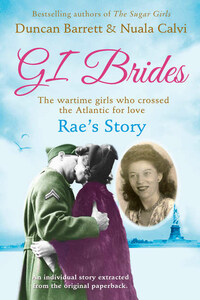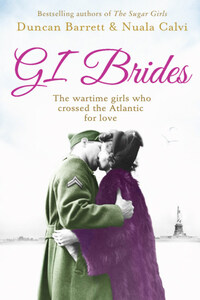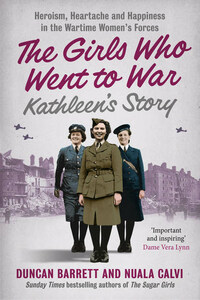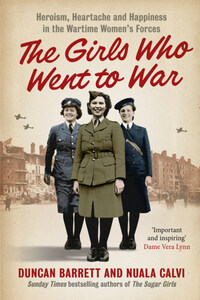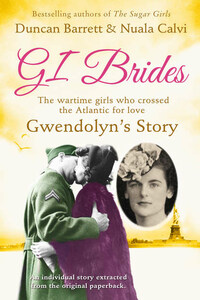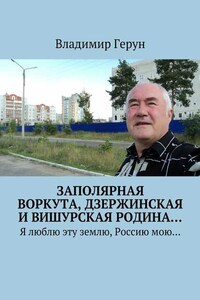Rae Brewer got out of the Underground at Acton, West London, and found her way to the address she had noted down from the newspaper. She had chosen a day when she knew her mother and stepfather were out at a wedding and wouldn’t notice her absence. No one else knew it yet, but Rae was about to join up.
She was only seventeen, but for some time she had been itching to follow her older brothers, Vic and Bill, into the Army. Despite having cascading brown locks and a striking kind of beauty, Rae had always been a tomboy, dressing herself in her brothers’ trousers, rather than the skirts her mother wanted her to wear. Her real name was Rosetta Mae, but from childhood she had gone by her less girlish nickname. She had been pleased to get a job as a drilling operator after school, but after a while she began to long to do something that would make a real difference in the war.
She had good reason to want to fight the Germans. During the Blitz, her family had been bombed out twice in Holloway, North London – both times on the same road. Her real father had been gassed by the Germans early in the First World War and spent most of the conflict in a prison camp, returning so emaciated that he had to wear a sign around his neck with his name on it so his wife could recognise him. During the first few years of Rae’s life he was bedridden and continually fighting tuberculosis, which he had picked up in the camp. By the time she was four, he had died.
At the recruiting office of the Auxiliary Territorial Service, physical exams were being held for the potential recruits. The girls were sent two to a cubicle to undress, and then were given the standard medical examinations. Rae felt confident that she would pass – she had always been a sporty girl, and had been an avid swimmer, before the local pool had been turned into a morgue for Blitz victims.
Then the girls were sent to the eye doctor to check their sight. Rae’s heart sank. She had never had good vision in her left eye, and though she had learned to cope with it, she knew it would let her down.
The doctor saw her distress. ‘How badly do you want to get in?’ he asked quietly.
‘Pretty badly,’ Rae whispered.
The doctor raised her to an A3, and she was in. Rae was ecstatic.
When she got home, her parents were still out, but her elder sister Mary was there. ‘Mary, I just went down to Acton and joined the ATS!’ she told her nervously. ‘I don’t know how I’m going to tell Mum.’
Before she had a chance to answer, the door burst open and in walked Mr and Mrs Burton, slightly tipsy. As soon as she saw the look on her daughter’s face, Rae’s mother knew something was wrong.
‘What’s happened?’ she asked.
‘I joined the Army, Mum,’ Rae replied.
Her mother was quiet for a moment. ‘You know I could stop you,’ she said. ‘You’re still only seventeen.’
‘Yes,’ said Rae, ‘but they’ll get me anyway in the end.’
‘All right then,’ her mother sighed. She knew there was no point in arguing with Rae once her heart was set on something.
On the long train journey to Glencorse Barracks, a few miles south of Edinburgh, Rae’s enthusiasm and excitement only grew with every mile. Her contingent of raw recruits arrived at 11 p.m. and was met by a brusque Scottish sergeant with flaming red hair, who led them on a march to the camp. This was no mean feat, given that many of the women were wearing heels, and they couldn’t help laughing at themselves as they clip-clopped along while she barked ‘Left! Right! Left! Right!’
The recruits made slow progress, but finally arrived at the barracks and marched into a parade ground. They were led inside a large building and told to line up with their hands on their hips, while a doctor went down the line giving each of them an injection in both arms. Next, they were taken for a hair inspection, to ensure they were free of head lice and that their hair was the regulation two inches off the collar.
Rae hadn’t been bothered by the injections, but she was bothered now. Even when rolled up, there was no way her hair was going to be two inches above her collar.
‘You’ll need to have that chopped off first thing in the morning,’ the sergeant told her.
‘You’re not cutting my hair!’ she retorted. She viewed her long, dark locks as a source of pride.
‘Aye, we are,’ the woman replied. ‘Report back here at 6 a.m.’
Before Rae had a chance to reply, the women were marched to the mess for dinner. Having lived on meagre rations, she was looking forward to a good feed, but even so she couldn’t help finding the fatty mutton that was served up almost inedible. The recruits were expected to eat every last morsel, however, and a scary-looking woman stood on guard duty by the bin, just in case any of them thought of discreetly disposing of it.
Next they were led to the corrugated-iron Nissen huts where they were to sleep, eleven to a hut. Each girl had a little wooden bed frame on which there were three individual squares of mattress, one next to the other. The girls soon found that these thin squares had an annoying tendency to move if they turned over in the night, throwing out the arrangement and giving them sore hips. Even more troubling was the cold – it was February, and in Scotland that meant sub-zero temperatures in the metal hut.
